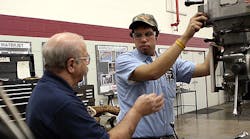The work I do is not easy but nor am I irreplaceable. I think any number of other people could do it, provided he or she has a few “skills,” personal talents and inclinations. First, be able to read with understanding and write with clarity. You must be patient, because you’ll frequently have to reread and rewrite in order to know your conclusion is accurate and satisfactory. It’s necessary also to study an array of subjects, reviewing things learned already, investigating fields of established knowledge, and taking up areas of emerging information.
These are basic skills, of course, and while they can be learned we all realize that the general proficiency of reading and writing has been diminished over the past several decades. The current standard seems to be that if one can jot down or tap out the general sounds one would make by speaking the same ideas, that it is sufficient for communication. Experience proves otherwise.
“Skills”, in other words, need to be taught, and they do not become “skills” again in another person until they are learned. And, the one who learns the skills has to commit to maintaining and enhancing those skills. It is the work of a lifetime.
I am pondering all this because the notion of an apparent “skills gap” is now an article of faith among business and industrial experts, educational professionals, and of course manufacturing executives and leaders. Every week brings me news of programs being established to improve the manufacturing skills training programs and resources available in different industrial sectors, and in different regions.
The concern is particularly over the availability of job candidates with “tech skills” — an unfortunately general phrase that covers interpreting and developing software; CNC machine programming operation, and repair; electrical and mechanical assembly; mechatronics; quality assurance and safety program administration; and all this without exploring the particular skills needed within vertical manufacturing market, for example material science and metallurgy, thermal and mechanical engineering, and so forth.
It’s not hard to conclude that the astonishing influence of high technology and Big Data has exposed the inadequacies of the people working in manufacturing. Recently I learned that 55% of manufacturers surveyed by Accenture reported a “skills gap” between workers and the machinery they are required to use, a 17% increase in that number over the past three years.
But I suspect this anxiety is linked to a broader and deeper sense of inadequacy that is not so obviously linked to technology. The proliferation of online training and degree programs aimed at individuals is a response to this: people feel overwhelmed by the complexities of the world around them, and they’re convinced that more credentials or some elusive wisdom will resolve their doubts.
The plague of uncertainty and self-doubt is evident in subtler ways too, for example in the various subscription services that will deliver all the ingredients and guide you to preparing a trendy gourmet meal or throwing together a striking wardrobe. The Internet and television are full of “hacks” that will show you how clever you could seem to be if you just make the right decisions or adjustments.
The world is complex and confusing, and technology has been our lifeline to solving all the problems we identify. Technology is meant to supply the proficiency, convenience, and certainty we sense is missing. Is it really so surprising that technology is exposing our inefficiencies, our inadequacy, or failure to compete?
People who identify a “skills gap” are onto something. But they do not seem to be addressing other gaps that are being exposed as we proceed into the technology-driven, networked future. I find it revealing that most of the problems identified by the skills gap have a financial or commercial corollary: the business cannot compete without better talent to operate better systems; the individual cannot improve without better qualifications.
What seems missing is the appreciation for skills that are developed over time, by trial and error, and by exposure to the work and skills of others. The value of this type of skills training is hard to quantify – which may be the reason it has been priced out of many organizations. But it is hard to appreciate manufacturers’ concerns about a skills gap without also wondering how so many organizations came to this moment, and now are unprepared for the consequences.









